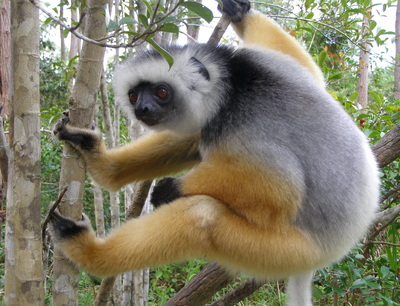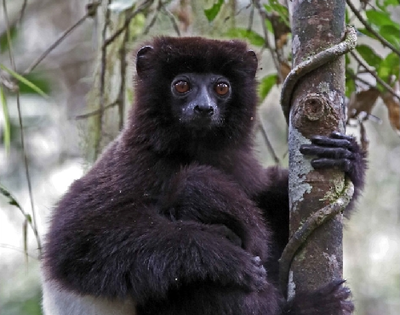PROJECTS
In LEEP we conduct our own research and support others at the University of Arizona and elsewhere with their research. Below are some of the projects on which we have worked.
Effects of Environmental Degradation on Threatened Lemur Species
Lemurs are some of the most endangered species in the world due to habitat fragmentation and deforestation. Examining stress and coping responses via cortisol may provide information as to how individuals strategically deal with change. In combination with phenological data from fragmented and continuous forests, behavioral data, and health assessments, we are measuring cortisol and thyroid hormone in Eulemur rubriventer and Propithecus edwardsi in Ranomafana National Park, and Propithecus diadema in Tsinjoarivo. This work is in collaboration with M. Irwin, J. Jernvall, and P. Wright, and has been supported by the National Geographic Society, National Science Foundation, American Association of University Women, PEO Foundation, Primate Conservation, Inc., Conservation International Primate Action Fund, American Society of Primatologists, and the University of Texas-Austin. You can read some of this work here.
Mechanisms of Allomaternal Care
|
The red-bellied lemur (Eulemur rubriventer) is a model species for investigating the evolution of allomaternal care (care of infants by individuals other than the mother) in primates. In LEEP we are investigating the mechanisms of allomaternal care by examining whether and how hormones are associated with variation in allomaternal care behavior. We are particularly interested in bonding hormones such as oxytocin and vasopressin, as well as steroid hormones that may impact, and be impacted by, allomaternal care. This work is in collaboration with A. Baden, and has been supported by the Leakey Foundation, American Association of Physical Anthropologists, and the Social and Behavioral Sciences Research Institute. You can read our work on allomaternal care and androgens here, and our work on paternal care and estradiol here and here.
|
You can see a video about our work in the lab and in Madagascar here.
|
Hormonal Responses to Infant Caregiving
We are working with two groups at UArizona to study hormones in new mothers. With Dr. Alicia Allen in the College of Medicine, and Lela Williams in the School of Social Work at Arizona State University, we are working on the ORCHID study (Observing Relationships between Caregiving and Hormones after Infant Delivery). We will investigate the hormonal response to infant caregiving to develop a novel strategy that could help break the opioid relapse cycle during the postpartum period. The second project is a new collaboration with Dr. Aleeca Bell in the College of Nursing, on mother-infant synchrony among women with childhood adversity. In LEEP we will analyze oxytocin and a set of steroid hormones in new mothers and their infants. Both studies are supported by the National Institutes of Health.
Oxytocin Methods Development
UArizona Graduate student Gita Gnanadesikan has been working with us and Dr. Evan MacLean to develop rigorous methods to measure oxytocin in plasma, urine, and saliva in a variety of species. You can read about this work here (plasma oxytocin) and here (urinary oxytocin)! We have most recently determined that neurophysin I is an analytically robust surrogate biomarker for oxytocin, which you can read about here.
Human-Animal Interaction
In collaboration with Dr. Evan MacLean at UArizona, we are measuring oxytocin, cortisol, and arginine vasopressin levels in children and dogs to learn more about the psychological and health benefits of dog-child interactions. This work is funded by the WALTHAM foundation and the National Institutes of Health, and publications are on the way!
Maternal Styles in a Population of Working Dogs
In a study led by Drs. Emily Bray and Evan MacLean, graduate student Gita Gnanadesikan and lab tech alum Erica Cook are analyzing fecal cortisol, plasma oxytocin, and plasma vasopressin levels in dogs. This study will assess how a dam's maternal style and the amounts of care she provides affects each puppy's behavior, cognition, hormonal profile, and eventual success in assistance dog training programs. This work is in partnership with Canine Companions. You can see some of their work here.




